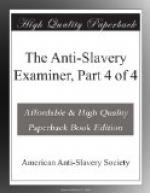OBJECTION XI.
This withdrawing from government is pharisaical—“Shall we, ’weak, sinful men,’” one says, “perhaps even more sinful than the slaveholder, cry out, No Union with Slaveholders?” Such a course is wanting in brotherly kindness.
ANSWER. Because we refuse to aid a wrong-doer in his sin, we by no means proclaim, or assume, that we think our whole character better than his. It is neither pharisaical to have opinions, nor presumptuous to guide our lives by them. If I have joined with others in doing wrong, is it either presumptuous or unkind, when my eyes are opened, to refuse to go any further with them in their career of guilt? Does love to the thief require me to help him in stealing? Yet this is all we refuse to do. We will extend to the slaveholder all the courtesy he will allow. If he is hungry, we will feed him; if he is in want, both hands shall be stretched out for his aid. We will give him full credit for all the good that he does, and our deep sympathy in all the temptations under whose strength he falls. But to help him in his sin, to remain partners with him in the slave-trade, is more than he has a right to ask. He would be a strange preacher who should set out to reform his circle by joining in all their sins! It is a principle similar to that which the tipsy Duke of Norfolk acted on, when seeing a drunken friend in the gutter, he cried out, “My dear fellow, I can’t help you out, but I’ll do better, I’ll lie down by your side.”
OBJECTION XII.
But consider, the abstaining from all share in Government will leave bad men to have everything their own way—admit Texas—extend slavery, &c. &c.
ANSWER. That is no matter of mine. God, the great conservative power of the Universe, when he established the right, saw to it that it should always be the safest and best. He never laid upon a poor finite worm the staggering load of following out into infinity the complex results of his actions. We may rest on the bosom of Infinite Wisdom, confident that it is enough for us to do justice, he will see to it that happiness results.
OBJECTION XIII.
But the same conscientious objection against promising your support to government, ought to lead you to avoid actually giving your support to it by paying taxes or sueing in the courts.
ANSWER. This is what logicians call a reductio ad absurdum: an attempt to prove our principle unsound by showing that, fairly carried out, it leads to an absurdity. But granting all it asks, it does not saddle us with any absurdity at all. It is perfectly possible to live without petitioning, sueing, or holding stocks. Thousands in this country have lived, died, and been buried, without doing either. And does it load us with any absurdity to prove that we shall be obliged to do from principle,




